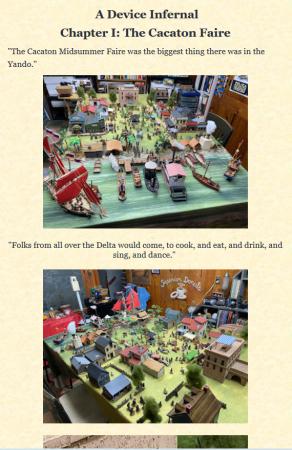
A Novel of the Opening of the World
335 pages.
I have previously read volume three of this trilogy, The Golden Shrine, and gave it a rather poor review. I thought it would be fair to the author to see if the earlier books were any better.
(I wouldn't have read the books "out of order," but there's nothing on the third volume to warn you it is part of a trilogy!)
The setting is the Raumsdalian Empire, a medieval-ish empire on an unknown world - a future Earth? the far-distant past? another planet? The author doesn't tell. The Empire is vast and autocratic, set in the far north, and employs armies aided by war-magicians.
Beyond the Empire is the tundra, where the Bizogots - sort of a Viking/Eskimo mix - live nomadic lives herding mammoths and musk oxen. And beyond them is a great glacier.
As the novel begins, Count Hamnet Thyssen - a dour but dependable noble - has been called to the capital, where he is told to lead an exploring party. A Bizogot clan chief reports that after decades of melting, there is now a passageway - the Gap - leading to the land beyond the glacier.
Thyssen's group includes Ulric Skaggi, a former comrade-in-arms and sometimes imperial spy; Eyfind Torvinn, a scholarly noble seeking the mythical Golden Shrine (and is also married to Thyssen's scheming ex-wife, Gudrid); Audun Gilli, a wizard and recovering alcoholic; and Trasamund, chief of the Three Tusks clan of the Bizogots.
What will they find beyond the glacier? How dangerous will the trip be? And can Count Thyssen ever move beyond his failed marriage and find love again?
This is basically a travel narrative, as the group travels beyond the Empire and through the Gap, then returns to report, and then back to the tundra. Along the way, the author fills his readers' minds with details of the culture of the Bizogots, exploring the differences between the medieval settled culture of the Empire and the nomadic culture of the tundra.
In other words, this novel really drags. And if I wanted to read about nomadic culture, I'd read about real nomads, not some made-up fantasy nomads.
Without ruining the mystery of "what they find," I found it implausible that all of the major characters immediately realize that this is a great danger to the Empire. This reads like a bad case of "the hero knows what's in the writer's mind."
Not a great novel, not a lot of action, seems padded at times, not one I can recommend.
On the other hand, this book is miles better than The Golden Shrine. In this book, the characters are well-developed and interesting, and the "romance" sub-plot is handled quite well. Either the author rapidly declined in skill before the third book, lost interest in the trilogy, or had it written by someone else.
Reviewed by ![]() Editor in Chief Bill
Editor in Chief Bill ![]()
![]() .
.









